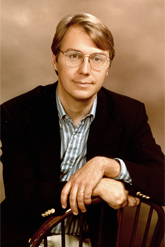How can understanding the origins of life on Earth inform our search for interplanetary life? Andrew Knoll, Fisher Professor of Natural History at Harvard University, has researched this question on an interdisciplinary level, and his answers have changed the way geologists view the environment and the way biologists view early life.
Dr. Knoll is a paleontologist, sedimentary geologist, geochemist, evolutionary biologist, and astrobiologist holding positions in both the Department of Earth and Planetary Sciences and the Department of Organismal and Evolutionary Biology. His work focuses in part on the first four billion years of Earth's history, Archean and Proterozoic paleontology and biogeochemistry. Specializing in the early evolution of life in the Proterozoic (544-2500 million years ago), he is arguably the foremost scholar on microfossils and the use of stable isotope chemistry to learn more about the age and environments in which the earliest forms of life lived. Extraordinary even amongst scientists of his own field, Knoll's research has contributed to an understanding of how organisms and the geochemical environment affect each other synergistically; to the diversification of plant life; to knowledge of how the earliest organisms diversified both in response to ocean and atmospheric chemistry; and to the metabolic processes through which these organisms have influenced the geochemistry from early times to the present.
Knoll's interests have led him beyond the terrestrial to the interplanetary: He is a Principal Investigator of the NASA National Astrobiology Institute team at Harvard, and a member of the Mars Exploration Rover science team. As a key figure in the strategic planning for these robotic missions as well as in the analysis of four-billion-year-old Martian rock samples, Knoll argues that salt deposits on the Red Planet reveal a brine too salty to support life as we know it (Science 2008). "This result suggests quite strongly," states Dr. Knoll, "that the surface of Mars would have been challenging for life." However, Knoll muses, "This doesn't rule out life forms of a type we've never encountered.... life that could originate and persist in such a salty setting would require biochemistry distinct from any known among even the most robust halophiles [species that can tolerate high salinity] on Earth (Harvard Science 2008).
Much in the tradition of Carl Sagan and Stephen Jay Gould, Knoll is recognized for his ability to explain complicated scientific vanguard research to a wide audience. In his award-winning work, Knoll has helped foster extensive acceptance of the possibility that life has multiple origins. His book Life on a Young Planet: The First Three Billion Years of Evolution on Earth (Princeton 2003) presents his ideas to the broader public, and has been called a "travelogue through time" that draws on the latest scientific discoveries, some of them his own; it was awarded the 2003 Phi Beta Kappa Book Award in Science. More recently, Knoll has been working with biologists to try to put into perspective what he calls today's catastrophic loss of biodiversity. Up to 50 percent of species on Earth are predicted to disappear within the next 100 years. His recent contribution to a publication in the New Yorker (May 2009) discusses this biotic crisis, ocean acidification, and human contribution.
Author of nearly 300 scientific papers, Dr. Knoll has also been featured in several "Nova" PBS documentaries and televised interviews for NASA, and is among TIME Magazine's 2001 "100 Best in Science and Medicine." Professor Knoll earned his PhD in Geology from Harvard, and has earned exceptional recognition and honors in the scientific community. In 1987, he was awarded the Walcott Medal by the U.S. National Academy of Sciences, the Charles Schuchert Award by the Paleontological Society, and in 2008 the Wollaston Medal, the highest award of the Geological Society of London.


